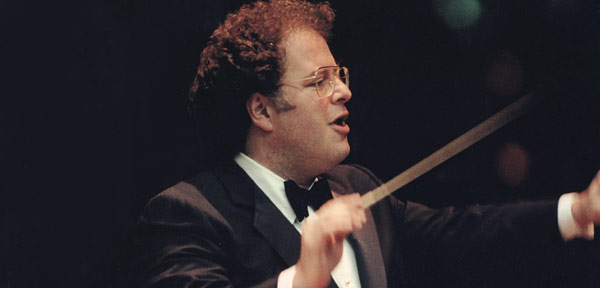But music is a living art. And no matter how glorious its past, in order to be fully alive, it must be constantly replenished by sounds that reflect the world as it is today, not as it was 300 or even 75 years ago. This season’s Ravinia schedule includes a range of artists who will be playing the music of the here and now as well as masters of the past.
Classical
James Conlon Sees His Time At Ravinia As A Continuous Highlight
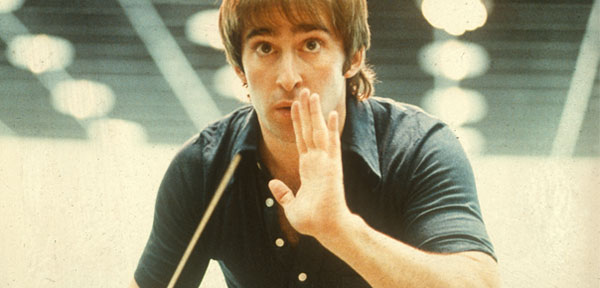
In looking back over my years at Ravinia, it is almost impossible to gather my thoughts in a linear fashion. The memories are so many; the musical experiences so rich, varied and exciting; the immense presence of the Chicago Symphony Orchestra so monumental, that it is difficult to condense into words.
Since I became music director of the CSO’s residency in 2005, I have been struck by how many music lovers I have met around the country and even overseas, who have told me that they heard their first concerts at Ravinia.
Singing In Tongues
I recently had one of those conversations that only occur between opera lovers and non-classical-music-loving friends. I mentioned having attended a performance of Debussy’s opera Pélleas et Mélisande with the Chicago Symphony Orchestra, an offering in their recent French festival. “An opera?” my friend asked, with a puzzled look. “Don’t operas have to be in Italian?”
Symphonic Shocker
To today’s audiences, who have heard nearly two centuries of music after the Symphonie fantastique received its premiere in 1830, Berlioz’s music sounds safe, melodious, beautiful, and brilliantly constructed, but nowhere near as jaw-droppingly shocking as it did to its first audience.
Fantasia: Disney’s once and future experiment in sight and sound
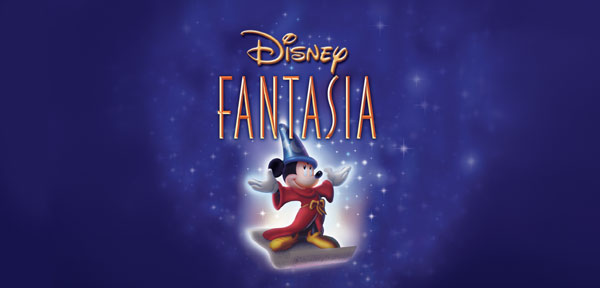
When Disney released Fantasia in 1940, it was so revolutionary in its scope, design, and use of technology that few knew what to make of it. Critics, often an impatient lot when confounded, mostly shunned it, as it fit no particular category. Was it a highfalutin cartoon, an animated anthology for longhairs, or a music-appreciation lesson for lovers of Mickey
Animated Music
The marriage of music and animation seems apt enough, since the essence of both is movement, and animation giants like Warner Brothers and Walt Disney issued their short theatrical cartoons under the series headings of “Merry Melodies” and “Silly Symphonies.” Often the music behind the cartoons consisted of sappy pop songs of the day or
Piano Men
When you love something as much as I love the sound of the harpsichord, it’s easy to slip into the invalid assumption that everyone else would love it too, if they were only familiar with it. But that notion took a knocking about five years ago when I was going to lunch in a car with several of my 20-something colleagues at Ravinia. I had just acquired the most spectacular-sounding recording of Bach’s Concerto for Four Harpsichords, and I put it in the car stereo to treat my coworkers to that glorious sound. But within 15 seconds of the start of
Meeting the Maestro
When I learned that James Levine would return to conduct the Chicago Symphony Orchestra at Ravinia for the first time since the end of a fabled tenure as music director, it made me think back to the first—and only—time I ever met him.
Conductor James Levine Returns To Ravinia For First Time In Over Two Decades
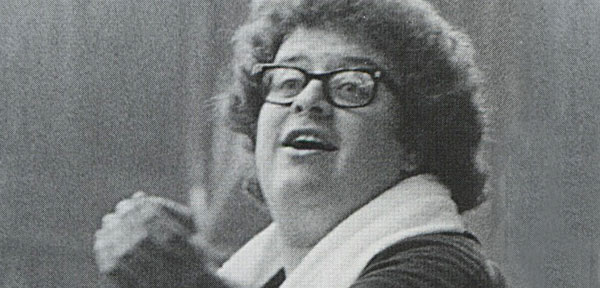
James Levine will celebrate the 45th anniversary of his Ravinia debut by returning to the festival for the first time since completing his music directorship in 1993. On July 23, 2016, Levine will conduct the Chicago Symphony Orchestra and Chorus in Mahler’s Second Symphony, the first piece he conducted at Ravinia on
Remembering Composer Stephen Paulus
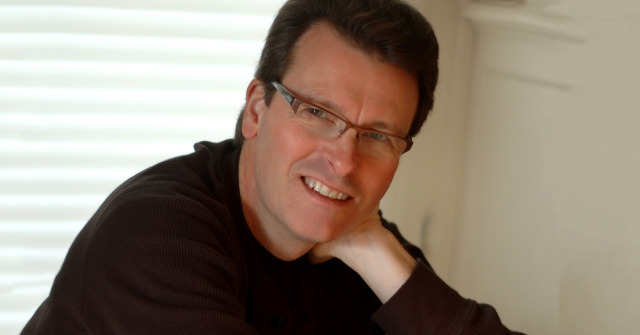
We were saddened to learn on Monday of the passing of the great composer Stephen Paulus. He suffered a stroke last summer, mere weeks before he was to join the faculty of Ravinia’s Steans Music Institute (RSMI) to work with our fellows in the Program for Singers. Stephen was one of seven composers commissioned to write a song to commemorate the 25th anniversary of RSMI in 2013, and his song, “Was It All a Dream,” was premiered in Bennett Gordon Hall by bass-baritone Musa Ngqungwana and pianist Renate Rohlfing on August 12 of that year. This was one of the last compositions of a prolific and celebrated career. Listen to Musa's performance on InstantEncore.
RSMI Alumna Joins 2015-16 Lyric Opera Of Chicago Ensemble

Every summer Ravinia's Steans Music Institute has the opportunity to work with a handful of talented musicians. Once they depart our program we make a point to keep in touch and are always excited to hear about their next milestones. With that in mind, we are happy to share the news that 2014 alumna Diana Newman has become part of The Patrick G. and Shirley W. Ryan Opera Center Ensemble for the 2015-2016 season at the Lyric Opera of Chicago! Congratulations Diana! You can learn more about Ms. Newman on her website and by watching the video of her August 11, 2014 performance (below) of three songs by George Crumb in the Bennett Gordon Hall.
Celebrating James Conlon In 2015
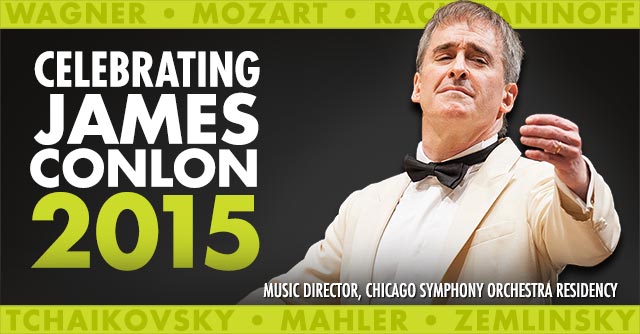
From the multiyear Mahler cycle, traversal of the complete Mozart Piano concertos, taking the Chicago Symphony into the Martin Theatre for a collection of Mozart operas and numerous other works, James Conlon has brought us many magical moments at Ravinia. James Conlon announced today that 2015 will be his final season as a music director of our CSO residency. Conlon and Ravinia President and CEO Welz Kauffman have shaped the 2015 season as a celebration of Conlon’s long association with Ravinia, where he has been a guest conductor since 1977.
Ravinia Presents Encore Screening Of Oscar-winning The Lady In Number 6
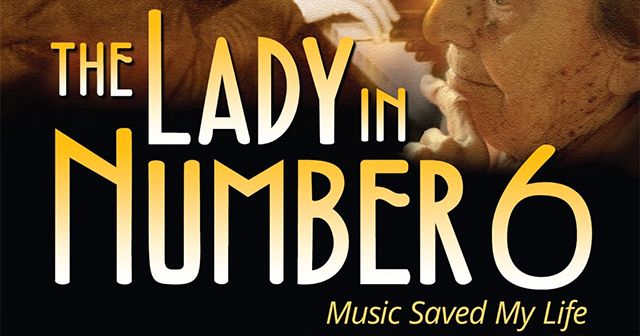
Ravinia will present an encore screening of this year’s Oscar winner for Best Documentary Short Subject, The Lady in Number 6, in Bennett Gordon Hall with free general admission to ticket holders for the Monday, Aug. 25, performance by Pedja Muzijevic featuring Chopin’s complete Op. 28 preludes. The film tells the riveting, true story of the world’s oldest pianist, who also happened to be the world’s oldest concentration camp survivor, Alice Herz-Sommer. Chopin was a particular favorite of the 101-year-old, who died just one week before the film won the Oscar. The 38 minute film begins at 4:45 p.m. with the concert starting at 6:00 p.m.
Last Chance to Win Cash for Your School by Attending Ravinia's CSO Concerts for Free
|
The 2014 Chicago Symphony Orchestra residency is winding down. That means there are only a handful of opportunities left to give your high school a chance to win cash for its music program. All high-school students are admitted free to the lawn for CSO concerts, but those students should sign in at the box office before entering the park to earn a point for their school. The school with the most points at the end of the season will win $5,000, awarded by the Ravinia Associates Board. For the first time in years, Highland Park High School is pressing its hometown advantage—here are the standings—but students can turn the tides by attending Don Giovanni on Aug. 14 and Aug. 16 or The Marriage of Figaro on Aug. 15 and Aug. 17. |
Chicago Tribune Explores Latest Teaming of Dame Kiri Te Kanawa and Jake Heggie
One of the great living singers of all time, Dame Kiri Te Kanawa, and one of the hottest classical composers working today, Jake Heggie, have been friends since the latter’s college years. The Chicago Tribune takes a look at some of the great art born of that relationship in a just-published interview. In the latest collaboration Heggie celebrates Kiri’s 70th birthday with a new song cycle commissioned by Ravinia and based on the poetry of Emily Dickinson. That world premiere, with Heggie accompanying the soprano, is part of a program featuring music by Richard Strauss and Mozart on Aug. 12 in the Martin Theatre.
Real Million-Dollar Quartet: CSO, Conlon, Bell and Women's Board
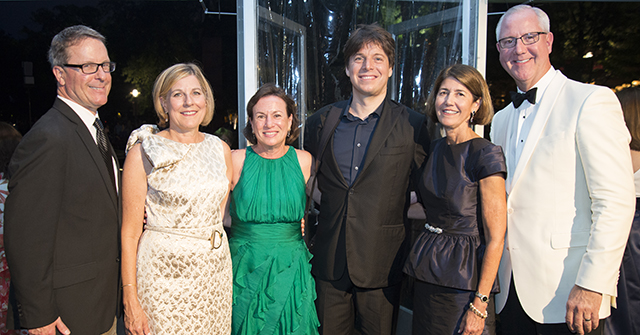
Ravinia congratulates its Women’s Board on a terrifically successful gala benefit, held Saturday, July 26. More than 700 guests attended the formal cocktail party, dinner and concert, grossing more than $1 million for the not-for-profit festival and its REACH*TEACH*PLAY education programs. The Chicago Symphony Orchestra was conducted by Residency Music Director James Conlon and joined by violinist Joshua Bell, both of whom attended the post-concert dinner. REACH*TEACH*PLAY serves about 75,000 people throughout Chicagoland each year, bringing music to underserved schools and communities.
Naked Singer? Cue The Television Crews!
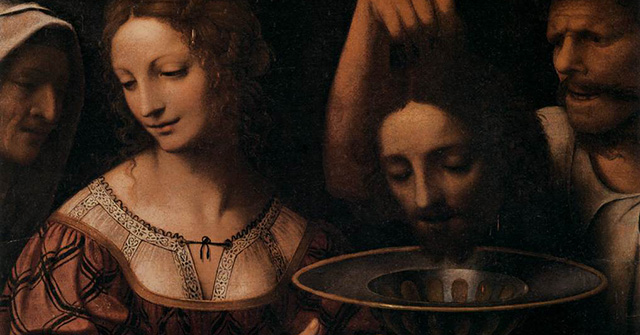
Before working at Ravinia, I spent slightly more than 13 years in the public relations department at San Francisco Opera. During all that time, the various general directors under which I worked unceasingly complained about the lack of TV coverage the company’s productions received. For every opera that was produced there, a media alert would be sent to all of the local television stations, desperately trying to interest them in coming to the dress rehearsal to publicize the opening. But it was mostly to no avail; even in an arts-crazed town like San Francisco, opera was deemed too esoteric an activity to be of interest to the general public.
But during the summer of 1993, SFO mounted a production of Richard Strauss’s Salome with opera star Maria Ewing in the title role, one of her most celebrated portrayals. Part of the attention she attracted stemmed from the fact that not only did she do her own dancing for the famous “Dance of the Seven Veils” (many opera divas leave that duty to a dancing double), but she also followed Oscar Wilde’s original stage directions that Salome should conclude the dance stark naked. Even singers who did their own dancing in other productions wore at least a body stocking for modesty.
In advance of the dress rehearsal, I struggled to find a way to imply without explicitly stating that Ms. Ewing would be baring her all—after all, we were a major international opera house and didn’t want to sound sensationalistic or exploitative. So I used phrases like, “SFO ‘Unveils’ New Salome Production.”
I must have succeeded: no fewer than five TV news crews showed up.
It should be noted that since Ravinia’s Salome on August 2 is a concert performance, Metropolitan Opera star Patricia Racette (who is undertaking the title role for the first time in her career) will remain fully clothed. As will the Chicago Symphony Orchestra.
Conlon Takes Podium with Eisler's and Korngold's Chamber Works
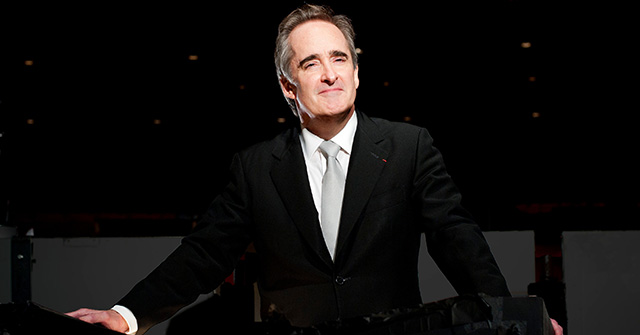
James Conlon, music director of the CSO residency at Ravinia, settles in for the season with a program focusing on works by Hanns Eisler and Erich Korngold, two composers who found success after fleeing Nazi persecution, on July 22. The Martin Theatre concert with soloists from the CSO features the Ravinia premieres of Eisler’s Fourteen Ways of Describing Rain, accompanied by the silent film Regen (Rain), and Korngold’s String Sextet in D Major. The program also includes Wagner’sSiegfried Idyll.
Kiri Te Kanawa Program Released

When Kiri Te Kanawa celebrates her 70th birthday with a Martin Theatre recital on Aug. 12, she will sing the world premiere of Newer Every Day, a set of five songs based on the poetry of Emily Dickinson, composed by Jake Heggie, who will accompany her on piano. Heggie is best known as the composer of one of the most successful operas of recent times, Dead Man Walking. The rest of the program has now been released and includes nine pieces by R. Strauss and works by Mozart, the composers most associated with the singer. The singer, who recently appeared on Downton Abbey, will also sings works by Mozart, Granados, Obradors and Guastavino, accompanied by Kevin Murphy, director of the Program for Singers at Ravinia's Steans Music Institute (RSMI). Kiri herself will give a free master class for RSMI singers in Bennett Grodon Hall at 2:00 p.m. on Aug. 10 in preparation for their Aug. 11 "Richard Strauss and Friends" concert.
Too Hot For Chicago

Richard Strauss’s sensational opera Salome, which had its world premiere in 1906, first came to Chicago in 1910, with soprano Mary Garden in the title role. The legendary singer would have a number of close ties with Chicago, but her Salome created a scandal seldom associated with the world of opera.
The Oscar Wilde play upon which the opera was based had originally been banned in England under a law that forbade stage depictions of Biblical subjects, but in actuality it was most likely because of the specific events depicted. To see a teenage princess dance with and ultimately kiss the mouth of the severed head of John the Baptist shocked many at the beginning of the 20th century, and the opera similarly met opposition—disapproval by the Catholic Church, for instance, kept Mahler from conducting it during his tenure as music director of the Vienna State Opera.


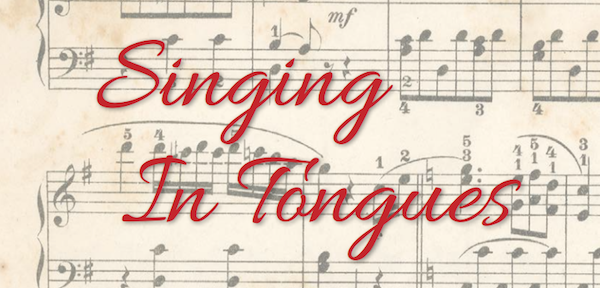
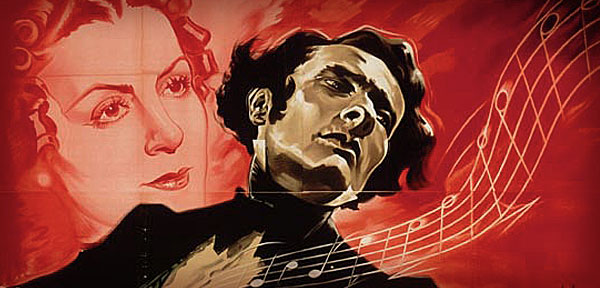
![By Warner Brothers Pictures/Leon Schlesinger Productions (A public domain cartoon featuring this title card) [Public domain], via Wikimedia Commons By Warner Brothers Pictures/Leon Schlesinger Productions (A public domain cartoon featuring this title card) [Public domain], via Wikimedia Commons](https://static1.squarespace.com/static/5ba3d1efa09a7e572c0e3bf0/t/5ba460dd542c0ec8ec286b52/1436212194447/1000w/Blog-MerryMelodies.jpg)

